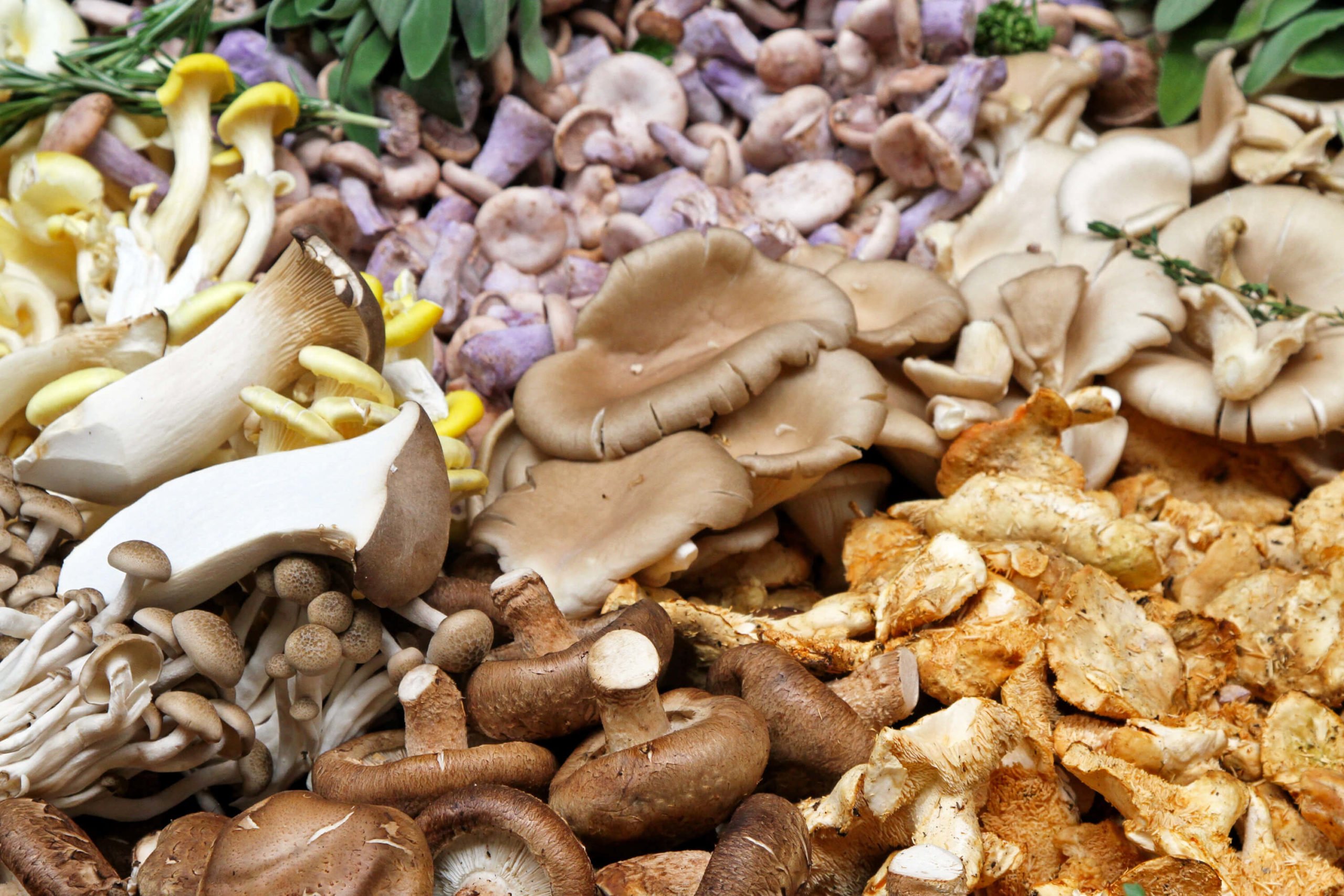Imagine a cooperative, kind, and generous society, where no one suffers deprivation, and all members are happily and freely engaged in useful labor that contributes to the community, according to their abilities and interests. Sound too good to be true?
While I don’t know of any actual societies that operate on those principles, I can point to at least one fictional community that embodies them pretty well — the Smurfs. First appearing in a Belgian comic book in 1958, the “3-apples-high” Smurfs have enchanted fans for decades. English-speaking audiences were introduced to the blue-skinned characters via a popular television cartoon that began broadcasting in 1981.
The Smurfs may have something to teach us about the creation and maintenance of a peaceable and sustainable civilization that supports the mental health of its members. One of the hallmarks of that civilization is the architecture of Smurf Village — the houses are built into hollowed-out mushrooms.
Is that a mere coincidence? Or could it be a clue?
The more we learn about mushrooms, the more we discover their profound benefits to our health. Recently, we’ve come to realize that these fungal fruiting bodies can also support our psychological well-being. In this article, we’ll explore the growing body of research on the mental health benefits of many different kinds of mushrooms. And you’ll come away with recipes to help you get mushroom wonderfulness into your life in easy and delicious ways.
Mushrooms — Past, Present, and Future
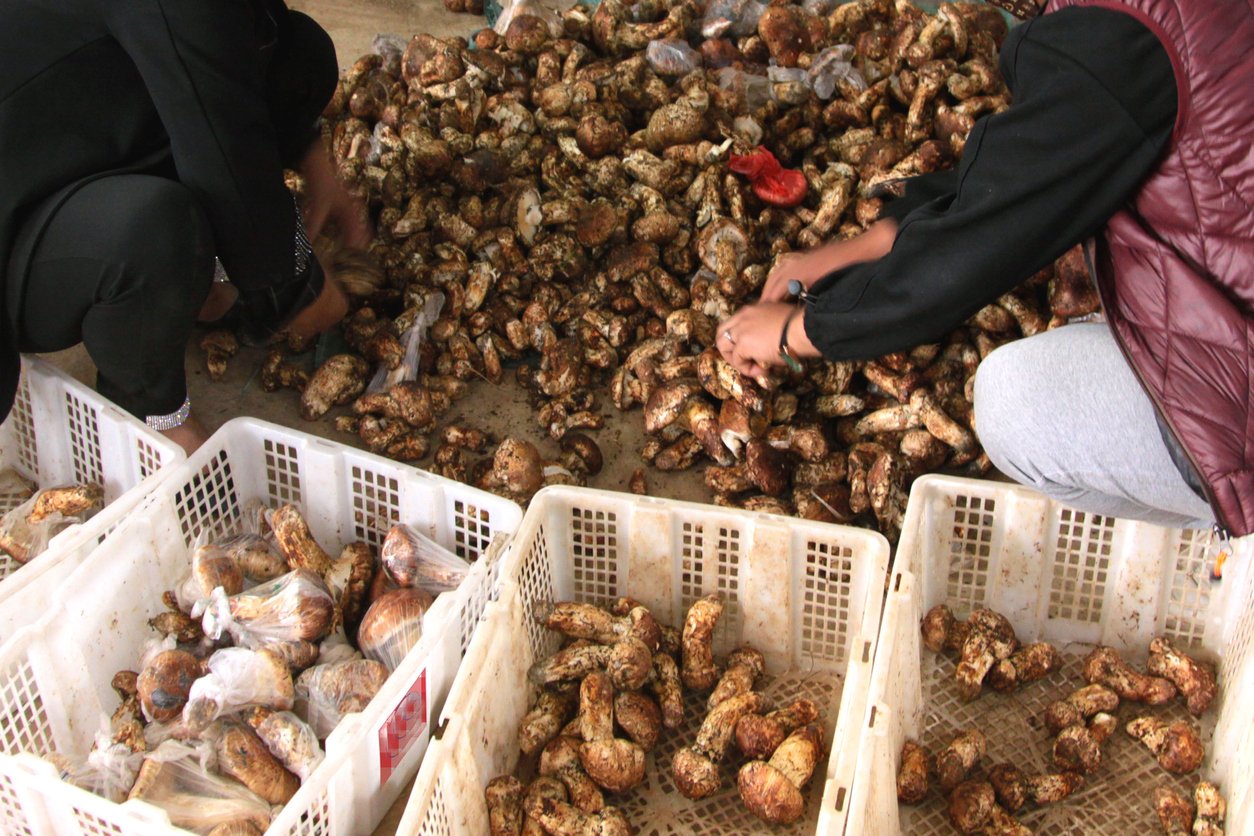
Humans around the globe have been consuming mushrooms for thousands of years. Since we learned how to forage and in some cases cultivate them, we’ve been coming up with more and more culinary uses, from soups and broths to pasta and noodle dishes, and more recently as meat alternatives in plant-based meals.
Some mushrooms are used as medicine, especially in traditional Chinese medicine and the ancient Ayurvedic discipline of India. Recently, science has corroborated much of this wisdom through studies showing that mushrooms have powerful anticancer, anti-Alzheimer’s, and immune-supporting properties. Longtime Food Revolution Network Summit presenter Joel Fuhrman, MD, includes mushrooms as the M in his famous G-BOMBS mnemonic of health-promoting foods (the letters stand for Greens, Beans, Onions, Mushrooms, Berries, and Seeds).
Mushrooms for Mental Health?
As the variety of their uses and benefits shows, mushrooms are incredibly versatile and valuable for human health. In addition to being good for your physical health, mushrooms have recently been recognized for their mental health benefits.
Learning how we can take steps to improve human resilience and well-being is especially pressing, given the current state of the world. Mental health challenges are rising worldwide. Depression alone accounts for 4.3% of the global burden of disease and is among the largest single causes of disability worldwide, especially among women.
In many communities, this has been further exacerbated by the COVID-19 pandemic and the social distancing measures adopted to flatten the curve of its spread.
Eating mushrooms, of course, does not directly address the social, political, and economic problems that contribute to so much emotional suffering. But they may provide us with complementary medicine to support conventional treatments for anxiety, depression, and other mental health conditions and even, in some instances, make pharmaceuticals unnecessary.
What Types of Mushrooms Are Good for the Brain?
While the human mind is much more than the physical organ known as the brain, having a clear and well-functioning mind depends at least partly on a healthy brain. And it seems that most, if not all types of edible mushrooms, confer some brain benefit.
Here’s a video about a study that took place between 2011 and 2017 that looked at the association between mushroom consumption and mild cognitive impairment in 600 Chinese senior citizens. The study found, remarkably, that those seniors who consumed more than two standard portions of mushrooms weekly reduced mild cognitive impairment by half:
https://www.youtube.com/watch?v=WvAI3mtFImY
The nutrients and functional qualities of mushrooms also appear to be beneficial for modulating mood. Eating mushrooms not only reduces the risks of many diseases, including dementia, but can also improve the subjective quality of life.
Let’s dive into the details to explore specifically how common culinary mushrooms and adaptogenic mushrooms may benefit our mental health.
How Are Mushrooms Good for the Brain & Mental Health?
Broadly speaking, there are three classes of mushrooms that humans tend to consume or tend to consume and live to talk about it. (There are many varieties of poisonous mushrooms that you do not want anywhere near your mouth) Edible mushrooms include culinary, adaptogenic, and, appropriately placed in their own category, (and beyond the scope of this article) psychedelic mushrooms.
Culinary Mushrooms
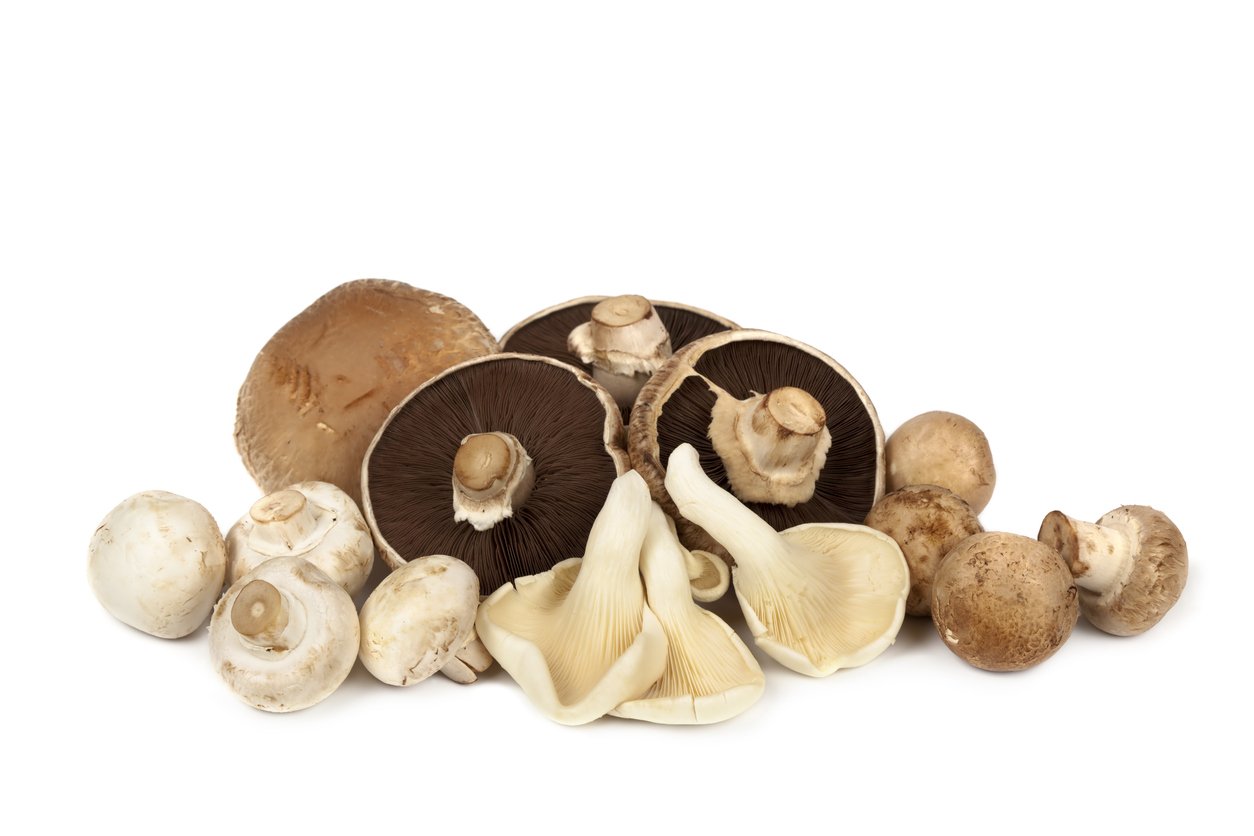
Culinary mushrooms are the ones you can eat in relatively large quantities with no ill effects. Think of the regular white or brown button mushrooms that you can find in just about any grocery store or market, and several mushroom varieties used in Asian cuisines, either fresh or dried.
Fun fact: Out of the 300 or so edible species of mushroom, we’ve domesticated just 30 (which means we can grow them on purpose where we want). Of those, just 10 are commonly grown commercially. Culinary mushroom varieties that you may have heard of (or even enjoyed) include white button, portobello, cremini, oyster, shiitake (gotta love that extra “i”), enoki, wood ear, and porcini.
Culinary Mushrooms and Depression
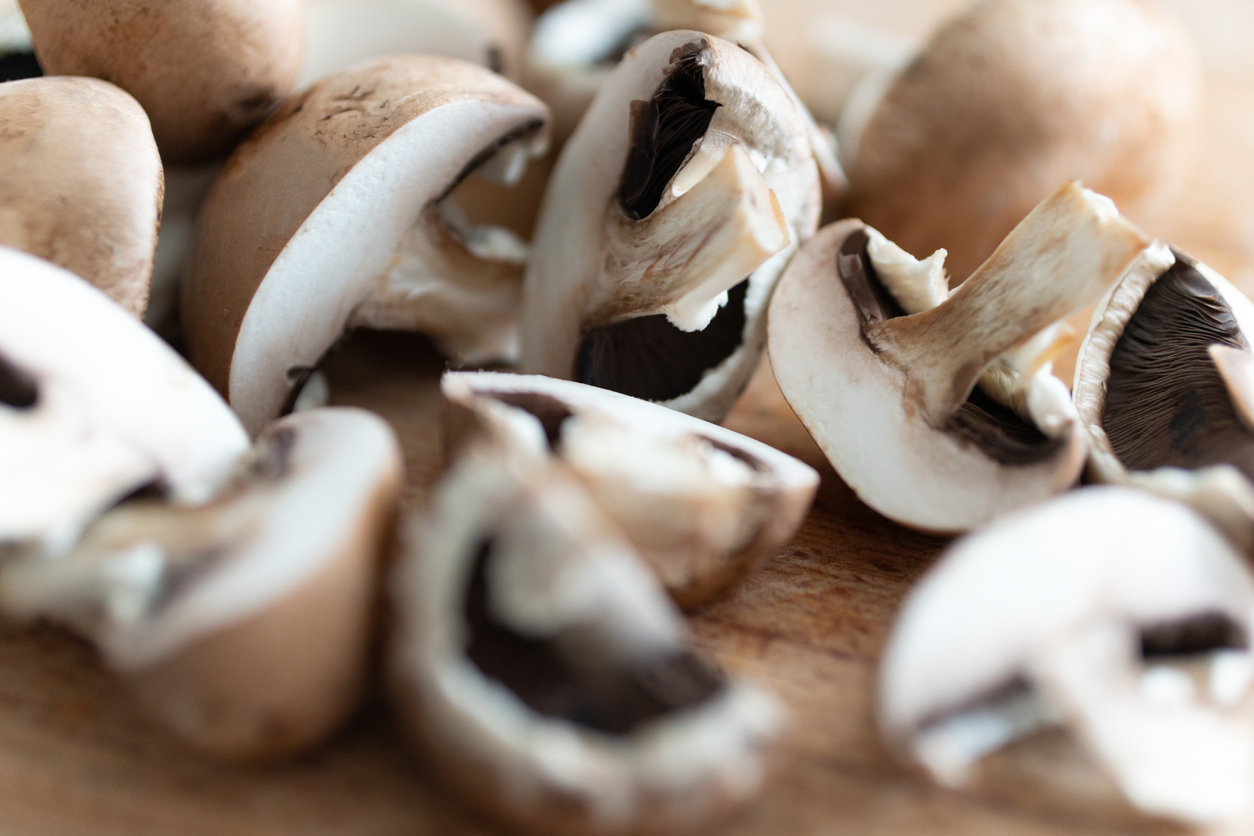
Those ordinary white button mushrooms may be among the healthiest brain foods out there. We know that they’re a good source of a couple of powerful antioxidants, ergothioneine and glutathione, which appear to be neuroprotective.
A survey of nearly 3,000 Americans over 60 found that a self-reported large quantity of mushroom consumption was associated with better performance on a series of cognitive tests.
Another study analyzed data on diet and mental health collected from almost 25,000 US adults between 2005 and 2016. The researchers categorized participants according to their mushroom eating. There was a zero-mushroom group, consisting (shockingly, to a mushroom-lover like me) of almost 24,000 members. The remaining thousand participants, who ate varying amounts of mushrooms, were significantly less likely to report symptoms of depression. Interestingly, the effect was independent of dose, which is a fancy way of saying that eating a lot of mushrooms didn’t appear to make people less depressed than eating just a few.
Ergothioneine and Glutathione in Mushrooms
Is there a plausible mechanism by which mushrooms could protect against depression?
Scientists may have found it in ergothioneine, an amino acid that acts as an antioxidant. It’s derived from histidine, one of the nine essential amino acids (those that we must get from food because our bodies can’t produce them). Mushrooms are the richest known source of ergothioneine, which may protect against cell and tissue damage in the body, including the brain (thus preventing cognitive decline). And less oxidative stress can also help explain the reduction in the incidence of mental health conditions like depression.
Another likely helper is glutathione, an antioxidant whose deficiency can also contribute to oxidative stress. Low levels of glutathione are seen in the urine of depressed people, suggesting that increasing its concentration in the body may help with recovery. While it’s long been known that mushrooms contain lots of ergothioneine, it was only in 2017 that scientists discovered that the glutathione levels in some mushroom species are actually higher than those in any other plant food. And it turns out that common white button mushrooms contain the highest amounts of both ergothioneine and glutathione.
Beta-glucans in Mushrooms
If that wasn’t enough, culinary mushrooms also contain beta-glucan fiber, which fights inflammation in the all-important gut-brain axis. While there are some other foods, such as oats, that also contain this type of fiber, researchers have discovered that the beta-glucan fiber in common edible mushrooms, in particular, increased the structural integrity of the prefrontal cortex of the human brain.
Adaptogenic Mushrooms
An adaptogen is a compound or food that helps the body maintain or regain balance in times of internal or external stress. Several varieties of mushrooms, including reishi, Chaga, Cordyceps, lion’s mane, and turkey tail, have adaptogenic properties. These and others are also known as medicinal mushrooms (can’t you just picture them with cute little lab coats and stethoscopes?). FreshCap is one of our favorite adaptogenic mushroom providers.
A review article from 2021 published in the International Journal of Molecular Science summarized the pharmacological activities of medicinal mushrooms as follows: “… antiallergic, antibacterial, antifungal, anti-inflammatory, antioxidative, antiviral, cytotoxic, immunomodulating, antidepressive, antihyperlipidemic, antidiabetic, digestive, hepatoprotective, neuroprotective, nephroprotective, osteoprotective, and hypotensive.”
One of the pathways that respond to adaptogenic mushrooms is the hypothalamic-pituitary-adrenal (HPA axis), a key component of the stress response system. The compounds found in mushrooms interact with the HPA axis to help regulate stress and mood, as well as improve memory.
Lion’s mane mushrooms in particular may have significant neuroprotective effects thanks to a couple of molecules that sound like monsters from Greek mythology — “hericenones” and “erinacines.” They are known as Nerve Growth Factors (NGFs) because they stimulate the growth and protection of neurons in the brain. NGF abnormalities have been associated with psychiatric disorders and lower levels of brain functionality.
Adaptogenic Mushrooms for Anxiety and Depression
In addition to their impact on physical health, these mushrooms also appear to provide support for mental health, emotional well-being, and mood.
Reishi Mushrooms
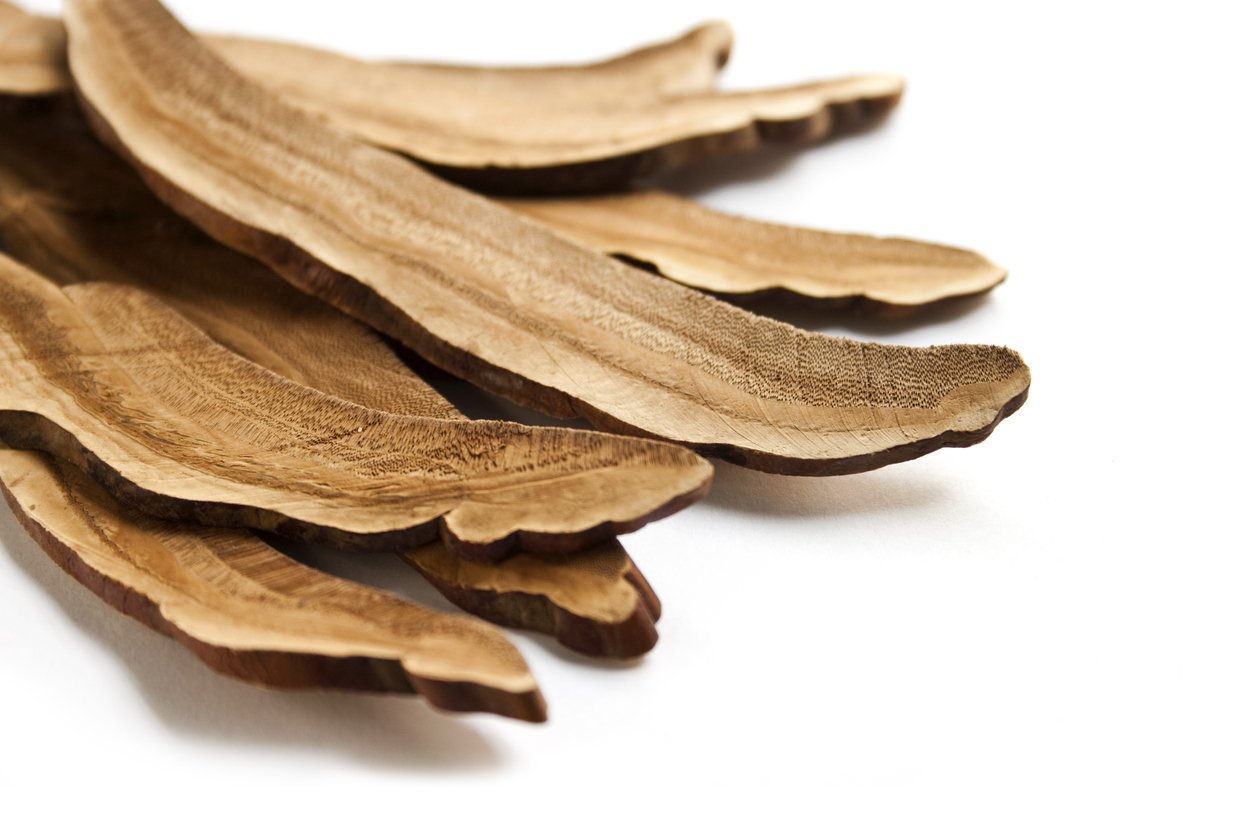
Reishi mushrooms were shown to reduce cancer-related fatigue and anxiety in breast cancer patients. An animal study found that reishi has antidepressant-like potential, and also was able to reduce anxiety in rats who had been subjected to a number of stressful experiences in a lab setting. (Our view on the use of animals in medical research is here.)
Lion’s Mane Mushrooms
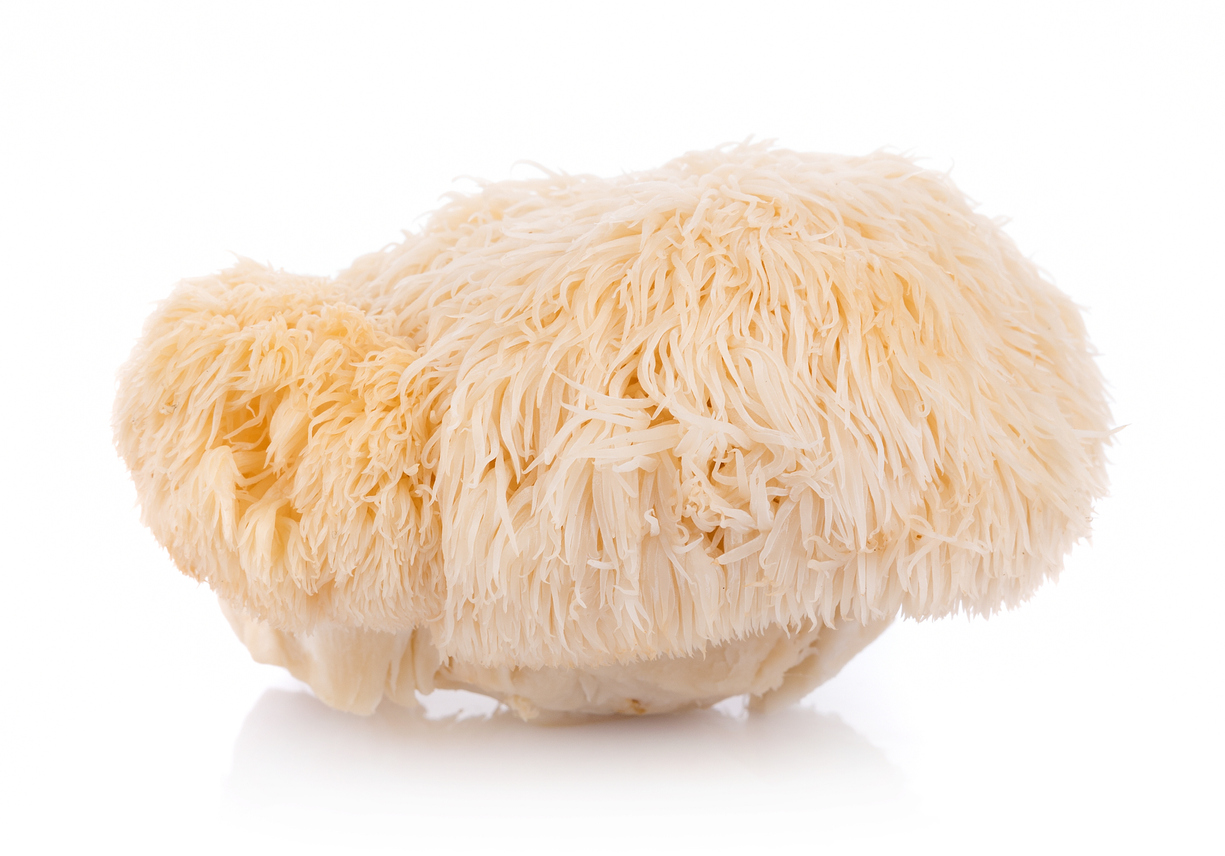
Isn’t lion’s mane a fun name for a mushroom? Sadly, I’ve never heard one of them roar. But a study on menopausal women did use lion’s mane mushrooms to alleviate menopause symptoms and found that they also helped reduce anxiety and depression. Another study showed that supplementation with powdered lion’s mane improved mood disorders of a depressive-anxious nature and helped people get better sleep.
The same study showed that lion’s mane also increased circulating levels of a compound called pro-BDNF (brain-derived neurotrophic factor), which gets converted to the active form BDNF. Since defects in the mechanism of conversion of pro-BDNF into active form BDNF have been linked with cognitive impairment, psychiatric disorders, and anxiety-like behaviors, it’s hoped that the mushrooms might help restore a healthful balance and improve cognitive and mental health.
Cordyceps Mushrooms
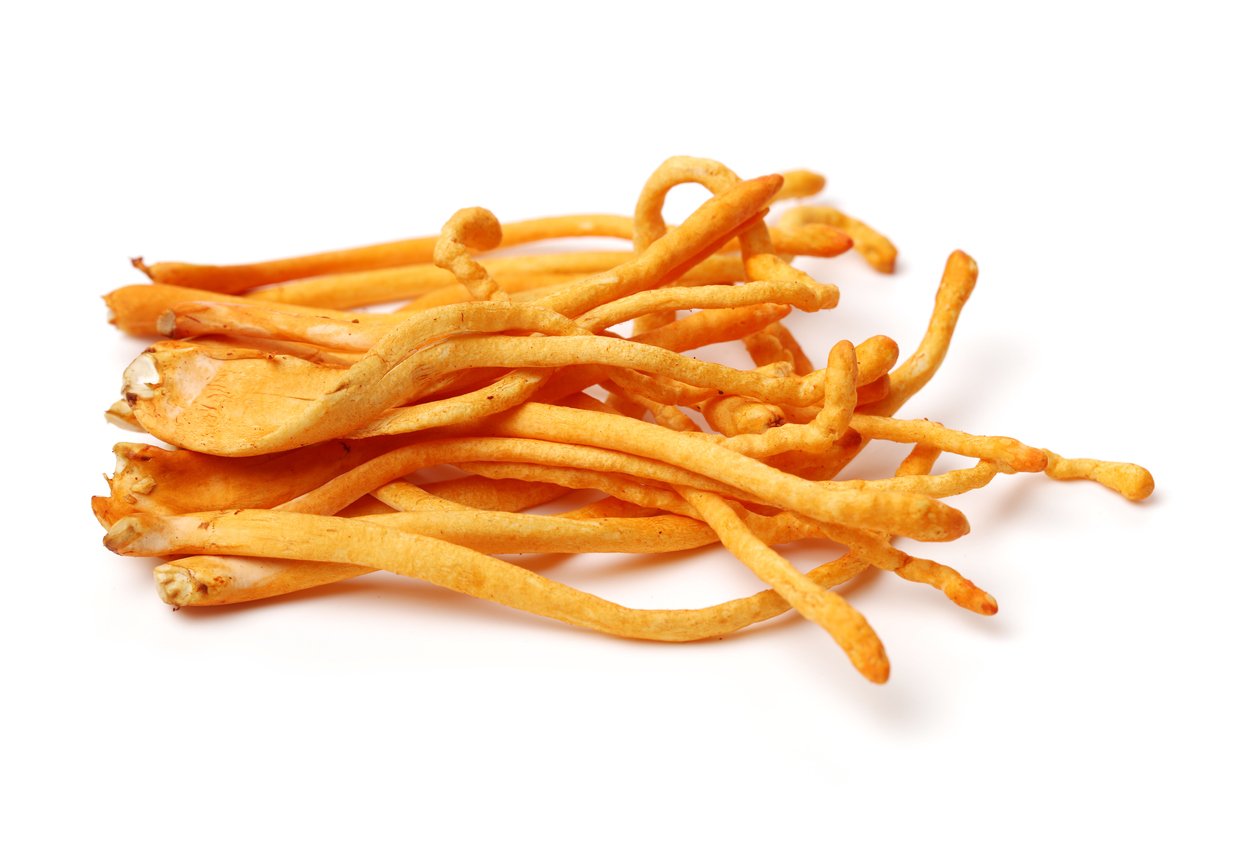
A 2020 study found that rats given high concentrations of cordyceps and poria (another adaptogenic mushroom) responded to “mild stressors” with less depression and anxiety than a control group. The researchers concluded that the mushrooms might be useful to prevent depression and anxiety in humans as well. In early 2022, a research team from China searched for likely biochemical mechanisms through which Cordyceps could exert its antidepressant effects. They found several, including CREB-binding protein, which appears to be a factor in depression and schizophrenia.
Mushroom Recipes to Fight Depression & Anxiety
Feed your brain, relax your mind, and help alleviate anxiety with the plant-powered, flavor-filled, magnificent mushroom dishes below.
Start your day with Mind Milk, which boasts of not one, not two, not three, but SEVEN ingredients that support brain health, including the adaptogen lion’s mane. Plus, it’s pretty darn delicious. Next up is a warming and nourishing salad with plentiful plants as well as shiitake mushroom bacon, which takes the place of traditional bacon, to elevate the flavor, texture, and nutrition of this dish.
Want to know our tip for the Supergreen Mushroom and Potato Soup? Make it. And, don’t delay. It’s bursting with flavor, easy to prep, and an opportunity to use any mushrooms you already love or would like to try.
The Oyster Mushroom Po’ Boy is a plant-based take on the Louisiana po’ boy that is traditionally made with meat or seafood. Swapping in mushrooms means swapping out ingredients that create inflammation (including in the brain) and adding ingredients, like fiber and antioxidants, that fight it.
Finally, porcini bring deep earthy and nutty flavor to creamy cashew cream to create a most satisfying, delectable, and savory Porcini Mushroom Cacio e Pepe that is perfect for sharing with the whole family!
1. Mind Milk

Help to restore and maintain mental health balance and improve cognition with each sip of this warm and comforting adaptogenic beverage. Lion’s Mane takes center stage in Mind Milk with support from other powerful plant ingredients — like turmeric, matcha, ginger, cinnamon, nutmeg, and clove — that have been shown to boost brain health. Okay, it seems that just about all of the ingredients in this recipe may support the brain. Perhaps that’s how this powerful yet tasty beverage acquired its name!
2. Warm Kale Edamame Salad with Shiitake Bacon
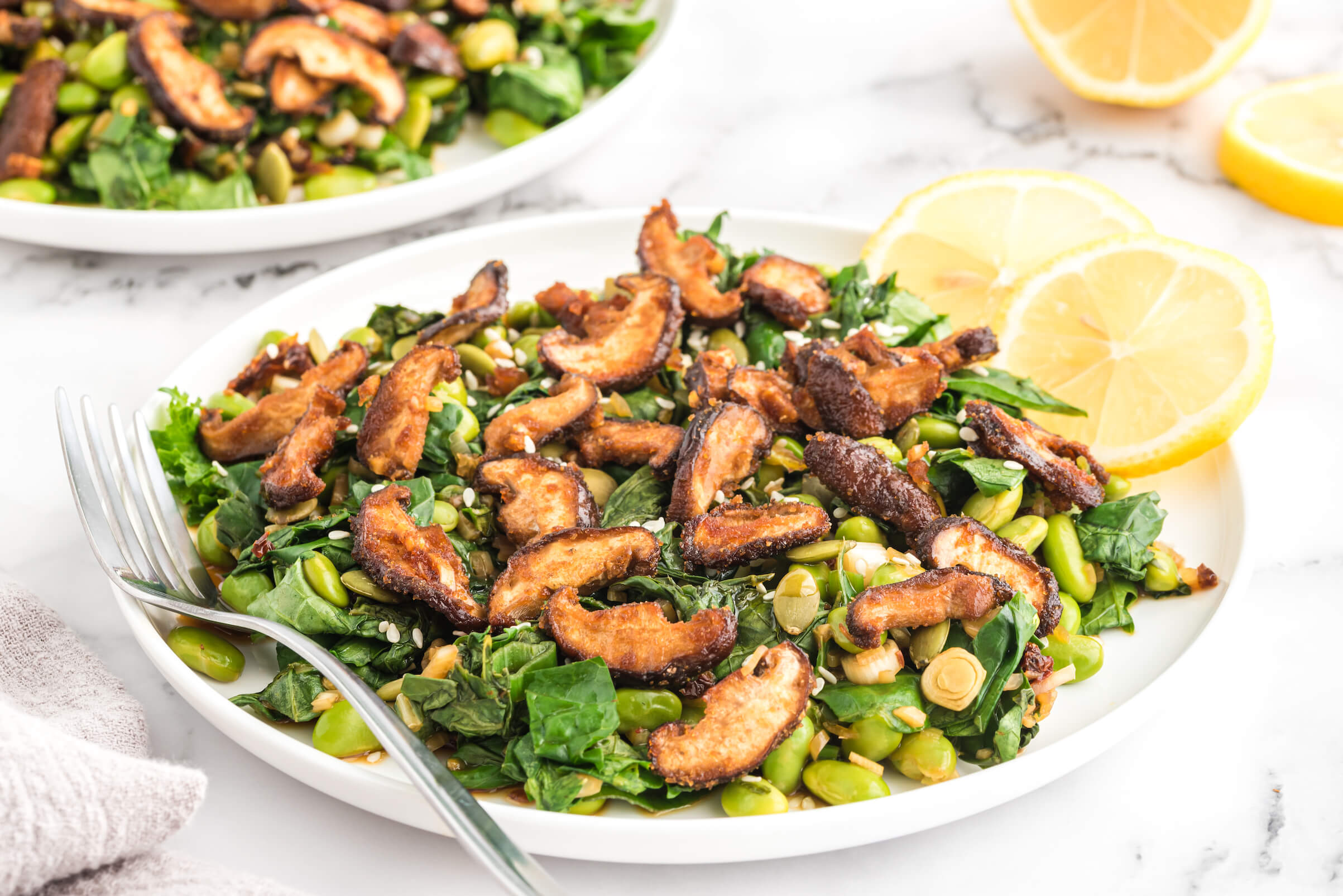
Crispy, sweet, and savory bacon — made from fiber-rich and antioxidant-packed shiitake mushrooms — takes the place of traditional bacon in this warm and nourishing salad. Not only do the shiitake mushrooms boost the nutritional value of this salad that’s already bursting with nutrients (we’re looking at you, kale, edamame, garlic, and pumpkin seeds), but it also up levels the flavor and textures. Make extra, because you’re not going to want to share!
3. Supergreen Mushroom and Potato Soup

Easy to make, flexible ingredients, and delicious results that also make great leftovers, need we say more? We will anyway! If good ol’ button or cremini mushrooms are your go-to and familiar to you, that’s fantastic! They taste delicious in this. Or, if you like to live on the adventurous side and want to try wild mushrooms, like maitake, oyster, or chanterelles, then this soup offers the perfect opportunity to experiment. Either way, you’ll be feeding your brain to thrive.
4. Oyster Mushroom Po’ Boy
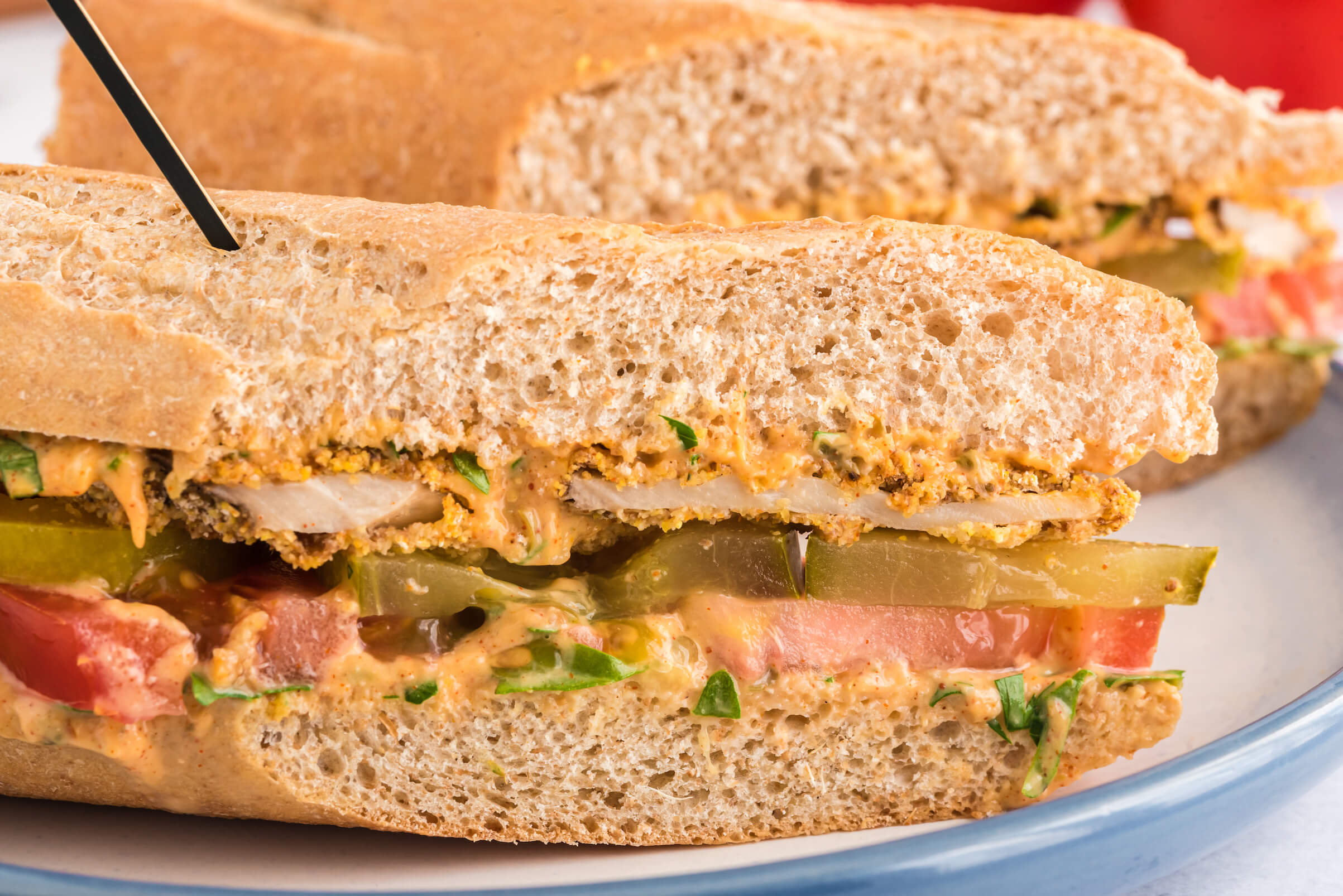
Fuel your brain and body by replacing meat (a source of saturated fat and other inflammatory and potentially carcinogenic compounds) and adding mushrooms (a wonderful source of antioxidants, plant-based protein, and fiber) in this exquisite version of a Po’ Boy. Oyster mushrooms make the ideal substitute thanks to their “meaty” texture and delicate flavor, taking on the seasonings you add to them in this comforting and satisfying sandwich hailing from Louisiana.
5. Porcini Mushroom Cacio e Pepé
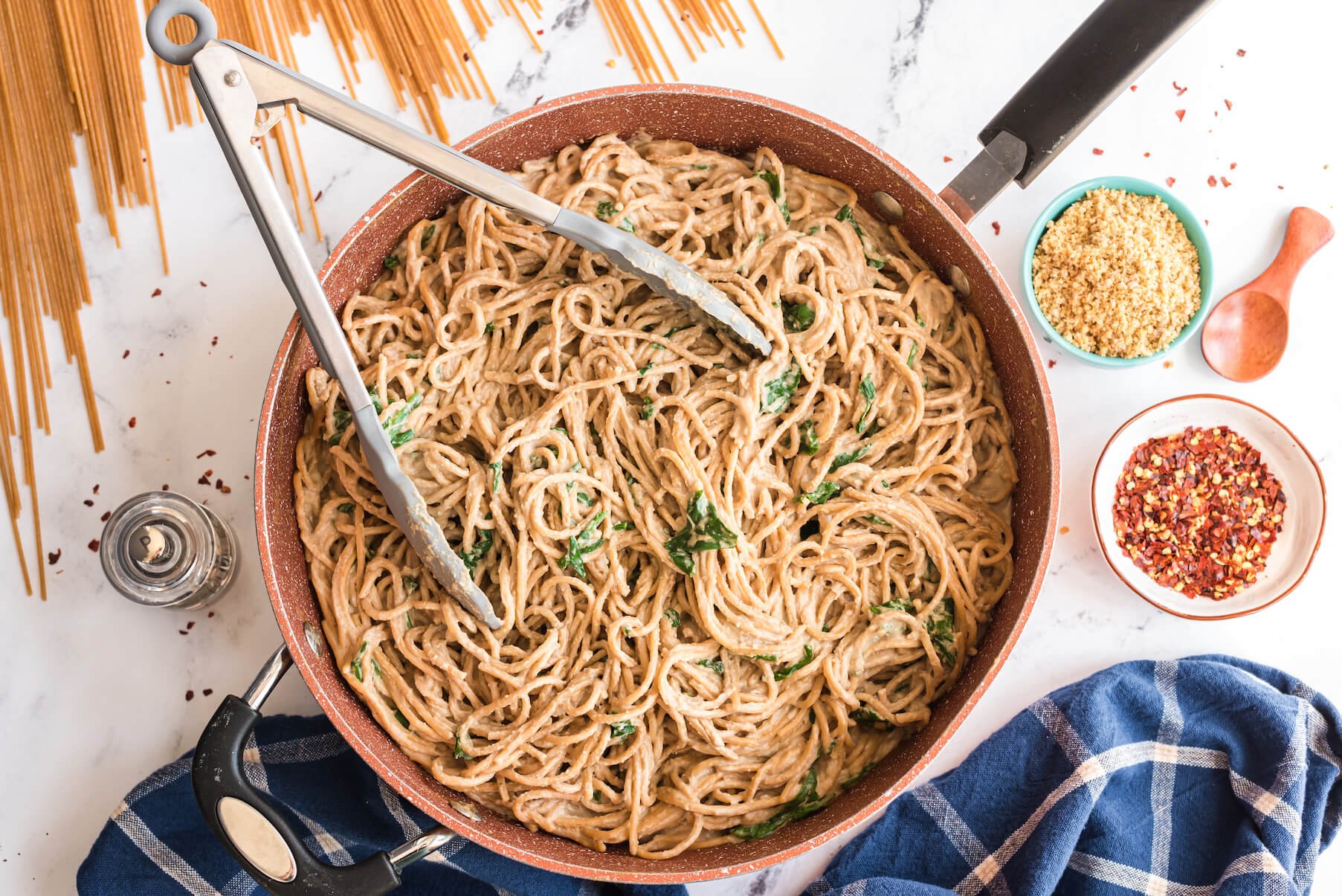
Porcini mushrooms have been described as having deep flavor with earthy and nutty notes and are often paired with Italian dishes like this Cacio e Pepé. In Italy, this pasta is traditionally made with parmesan cheese and black peppercorns plus either butter or olive oil. We’ve kept the black peppercorns and offered vegan parmesan as an option, but truthfully, the porcini cashew butter gives this dish so much flavor that you may decide to enjoy it without the parm. Enjoy the extraordinary flavor, creamy mouthfeel, and benefits to the brain!
Eat Mushrooms for Mental Health
Mushrooms are a versatile group of functional foods with many culinary applications and health benefits. The more we study them, the more we discover their potential to improve our lives. Across the board, mushrooms have demonstrated potential for positive impacts on mental health conditions such as depression, anxiety, and PTSD.
Eating mushrooms or drinking beverages that use mushroom powders can be a great way to utilize the power of fungi to support mental health naturally.
And that makes me think of a joke. Why did the mushroom help you feel better? Because he was a fun-gi!
Tell us in the comments:
- What kinds of mushrooms do you consume on a regular basis?
- Have you tried adaptogenic mushrooms? If so, in what forms?
- What surprised you the most in this article? What will you do in the future to benefit from this new knowledge?
Feature Image: iStock.com/Baloncici
